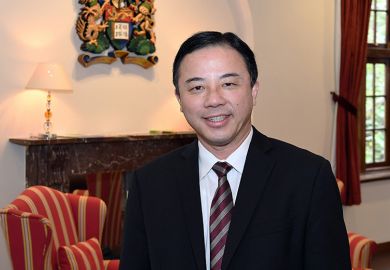Janet Beer, who took over as vice-chancellor of the University of Liverpool last month, has a persuasive theory about why there are so few female university leaders in the UK. There is, she argues, a misconceived ideal of “heroic leadership” that holds that leaders must be “more Zeus than Athena”.
In joining from Oxford Brookes University, Professor Beer becomes Liverpool’s first female vice-chancellor and one of only three at the 24 universities of the Russell Group.
Speaking to Times Higher Education, she said that female leaders are “concentrated at the smaller turnover end of the sector…The bigger the institution, the more research-intensive it is, the less likely that a woman will be entrusted with the leadership of that institution.”
Discussing a study that showed that women in the business world aiming to join company boards were expected to have financial backgrounds while men were not, Professor Beer said: “I think there’s a suspicion that we can’t read a balance sheet.” She added sarcastically: “I don’t know why. Maybe our brains are wired wrongly for it.”
Platform for advocacy
Her move to Liverpool is likely to give her a more prominent platform for her advocacy on female leadership and views on other sector issues. Her predecessor at Liverpool, Sir Howard Newby, favoured removing the cap on tuition fees. But Professor Beer’s personal view is that to do so would lead to the “segmentation of higher education”.
Professor Beer studied English at the universities of Reading and Warwick, before a career at Warwick, Roehampton and Manchester Metropolitan universities, specialising academically in the American novelist Edith Wharton. She led Oxford Brookes for eight years.
Asked about plans for Liverpool’s future, she said that strategy would be developed via a major consultation reaching throughout the university and the city and abroad as well. This will also be a way of “getting to know staff” and “engaging everybody in thinking about the future of the university”.
The late higher education professor Sir David Watson once memorably referred to the “bottom Russellers”, meaning the perceived lesser lights of the Russell Group. Although Sir David named no names, there may be some who think of Liverpool as an underachiever.
Professor Beer is quick to counter such views: “I think that there all kinds of things about Liverpool – not least a large number of its results in the REF [research excellence framework] – that demonstrate it to be absolutely world-class.”
She went on to paint a picture of an “entrepreneurial university” with a number of partnerships, including with Xi’an Jiaotong University in a jointly run institution in China. She also noted that applications to study at Liverpool are “up by 20 per cent” this year.
The university’s widening participation schemes came in for special mention. “All that kind of activity is to be celebrated in terms of its difference from many of the other members of the Russell Group,” she added.
One thing that may make Professor Beer unusual among Russell Group colleagues is that she is not a fan of higher tuition fees. “Personally, I would not deregulate. That’s a personal view – it’s not the view of the University of Liverpool.”
She explained: “I think it would lead to a real segmentation of higher education that would not be desirable for us as a nation.”
As for the lack of female leaders in universities, she does not, as some have done, blame the headhunters: “it must be the people from whom they take their instruction – that means governing bodies”.
Professor Beer added that the Committee of University Chairs, which represents heads of governing bodies, has begun to focus on this issue.
“The work to do…is about unconscious bias,” she said. “We need more thought about what leaders look like in the sector; less concentration on some kind of heroic model of leadership, something more about consensus-building and collaborative and partnership working at all levels.”
Job specifications, she continued, “can often emphasise qualities that aren’t necessarily about leadership in a well-balanced way”.
She added: “It doesn’t do anybody any harm to express uncertainty and to want to build an understanding of something. I think that people want vice-chancellors to arrive fully formed – and they don’t…You have to gradually build your leadership in any organisation.”
The need to improve the diversity of leadership applies to ethnicity as well, Professor Beer said.
‘Comply or explain’
In 2011, a government-commissioned report by Lord Davies of Abersoch on women in boardrooms said that all boards of FTSE 100 companies should aim to have 25 per cent female representation by 2015. Stopping short of recommending quotas, the report said that targets should be on a voluntary “comply or explain” basis.
At the recent Higher Education Funding Council for England conference, Professor Beer suggested to Greg Clark, the universities and science minister, that Lord Davies’ remit should be extended to higher education.
“Comply or explain” goals would be “most helpful”, she told THE.
Asked whether the public image presented by vice-chancellors is unhelpful in terms of a lack of diversity, Professor Beer said: “Since we are responsible for…changing people’s life chances, we need to model better behaviour ourselves.”
Register to continue
Why register?
- Registration is free and only takes a moment
- Once registered, you can read 3 articles a month
- Sign up for our newsletter
Subscribe
Or subscribe for unlimited access to:
- Unlimited access to news, views, insights & reviews
- Digital editions
- Digital access to THE’s university and college rankings analysis
Already registered or a current subscriber? Login





